Written by Jenn Hand, Holistic Nutritionist, Board Certified Health Coach, NBC-HWC
How to Stop Binge Eating
You’re wondering how to stop binge eating, and you’re probably hoping that there’s a simple 4-step checklist to follow to end the bingeing and restricting.
But there are many different ways to stop overeating and binge eating. And while I KNOW you can do it, what works for one person might not work for you.
Different tools and techniques resonate with different people. You may even find that some things help with different emotions and in different situations! We’ll dive deep in this post to help you take away some tips that will move you forward on your path to food freedom.
I battled bingeing for 13+ years.
My biggest struggle was always evenings; I’d wait until everyone went to bed and then crept into the pantry to shamefully eat in secret. One of my worst binges was right after I attempted a 7 day cleanse. I had a big work event coming up and decided to do this week-long cleanse to fit into a dress I wanted to wear.
I had done this cleanse before and had “success” (meaning I did it all 7 days).
After I finished the “successful” week, I ended up overeating (since the law of dieting says that if you go on, you go off!) and was attempting the same cleanse to “get back to” this place of feeling great.
This time around, I didn’t even last 3 days. By the end of day 3, I could not stop bingeing. I had a huge fight with my then boyfriend, had a million feelings swirling inside and couldn’t stop myself from eating.
🍏 Get the After-Binge Toolkit 🧰
If you want additional support, I’ve created an After Binge Toolkit to help you recover.
My binge foods were always sweets; whatever was in the pantry (and there was always hidden candy or dessert somewhere in there!) was fair game for me.
Although there are some big binges I remember, most of them blend together. My path to being binge free was a windy one–as much as I desperately desired a linear path, it was always a few steps forward and a half a step back.
I’ve been binge free for 10+ years, have helped thousands of women find their freedom and want to share what I’ve found to be the most helpful tips for myself and the women I’ve worked with.
Table of Contents
- The Importance of Regular Meals
- Tips for Overcoming Binge Eating
- 30 Ways To Stop Binge Eating
- How I Stopped Binge Eating and Lost Weight Naturally and Holistically
- Work with an Emotional Eating Coach and Holistic Nutritionist
- Common Questions about How to Stop Binge Eating
Prefer to listen to the podcast?
How Long Does It Take to Stop Bingeing?
In this instant gratification society that we live in, we secretly (or not so secretly) expect results fast.
When we’ve spent years (or even decades) in the diet world, we learn to think in terms of days or weeks. We do something for 30 days and expect a result. The path to being binge free is different. Achieving real, lasting change is all about learning to “let go” of bingeing rather than “make” yourself stop.
I spent years trying to mandate myself to stop.
The promises never worked. It was only when I began digging into the ‘real’ reasons I binged that I began to see small shifts over time. Letting go of bingeing happens gradually–you may go a few days without bingeing when normally you binged daily. Perhaps it extends to a week and then a few weeks. Over time, these stretches get longer and longer until you look back and realize it has been months since your last binge.
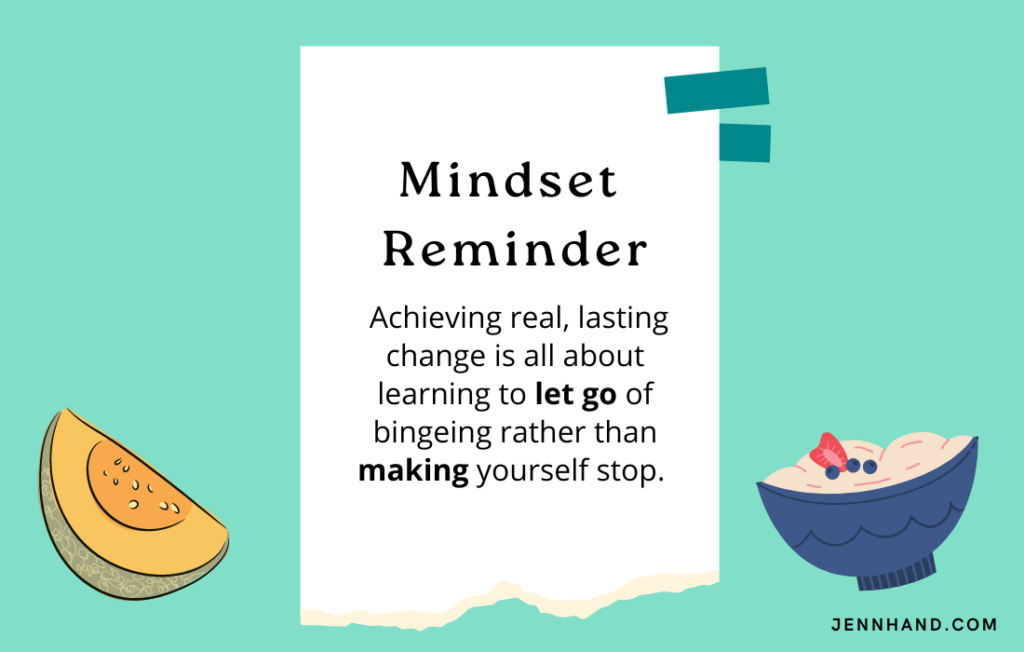
The Importance of Regular Meals
Whenever I binged, I would immediately attempt a diet the following day.
I’d try to eat as little as possible, cutting out carbs, sugar and anything I deemed “bad”. Depending on where I was on my journey, I’d last anywhere from a day to a few weeks. Once I began focusing on eating every 3-4 hours, and fueling my body regularly and often, it immediately helped cut back on my bingeing.
Having a regular cadence of meals helps to keep your blood sugar balanced, which helps you not have to rely on willpower.
As much as our minds tell us that we should go as long as we can without eating (especially if we have weight to lose), our body needs fuel consistently to be able to feel balanced and even. This regular cadence helps you rely less on willpower and white-knuckling, as you’re able to be in a much calmer space physiologically to make more conscious decisions around food.
Tips for Overcoming Binge Eating
- Eat regularly and often (every 3-4 hours ish) so you take yourself out of the “restrict” part of the binge/restrict cycle
- Examine where you’re labeling food as “good” or “bad” to help soften the critical tapes we have in our minds
- Look at every binge as a lesson to help you learn what triggered you, what emotions sent you there so you can learn how to make a plan for the next time
- Practice the utmost compassion with yourself as you are working to unlearn years of food habits and patterns
- Instead of going back on a diet, see if you can aim for balance, regular eating and nourishment
30 Ways To Stop Binge Eating
1. Watch Out for Binge Eating Triggers
Pay attention to what people, places (or things!) send you to the food. It could be a stressful day at work, meeting a friend you haven’t seen in a while, or a family member who knows how to get under your skin. When you’re aware of what causes a binge, you can create a plan to help work through the trigger.
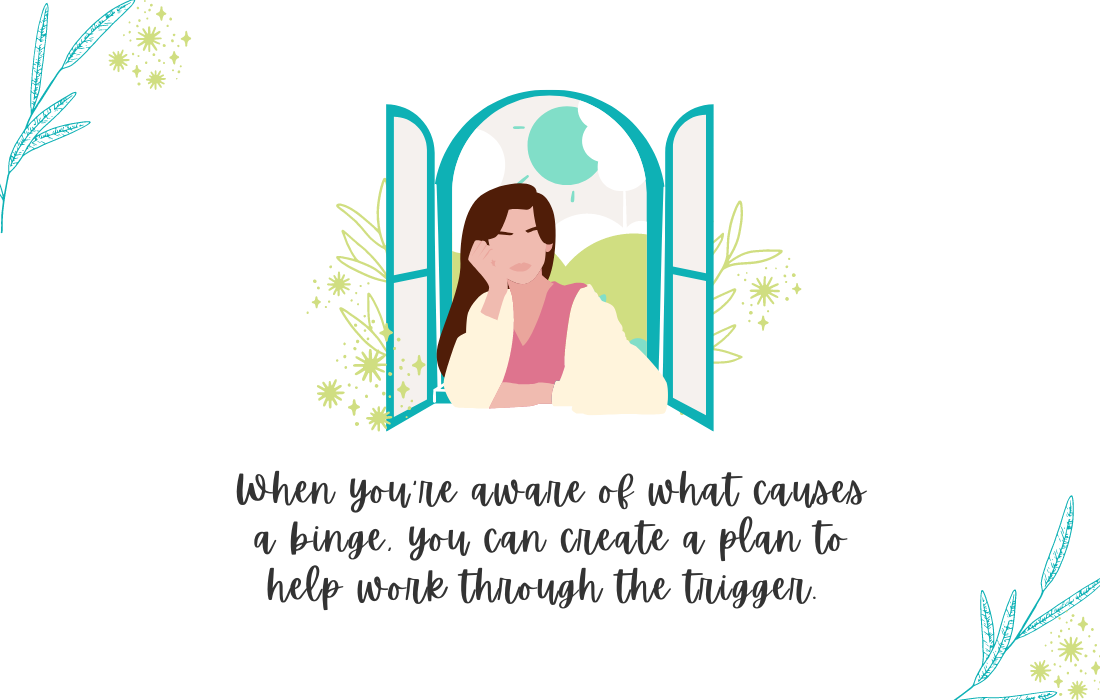
2. Be Present: Craft Your Mindful Eating Ritual
You can’t be mindful AND compulsive at the same time. Being present in the moment immediately stops a binge in its tracks. Experiment with slowing down, putting your food on a plate, and allowing yourself to receive whatever it is you want to ‘get’ from the food–this mindfulness can really help to take in what you’re wanting the food for (which in turn can help prevent or stop a binge!)
3. Get Comfortable with Discomfort
If we’ve used food to deal with life, it can be extremely uncomfortable when we are working to not binge. Moving through a craving, an urge, a feeling or a hard life situation is filled with discomfort. But discomfort doesn’t have to mean it’s “bad”! Learning to be uncomfortable as you’re putting down the crutch of food can help you move through something more “quickly”.
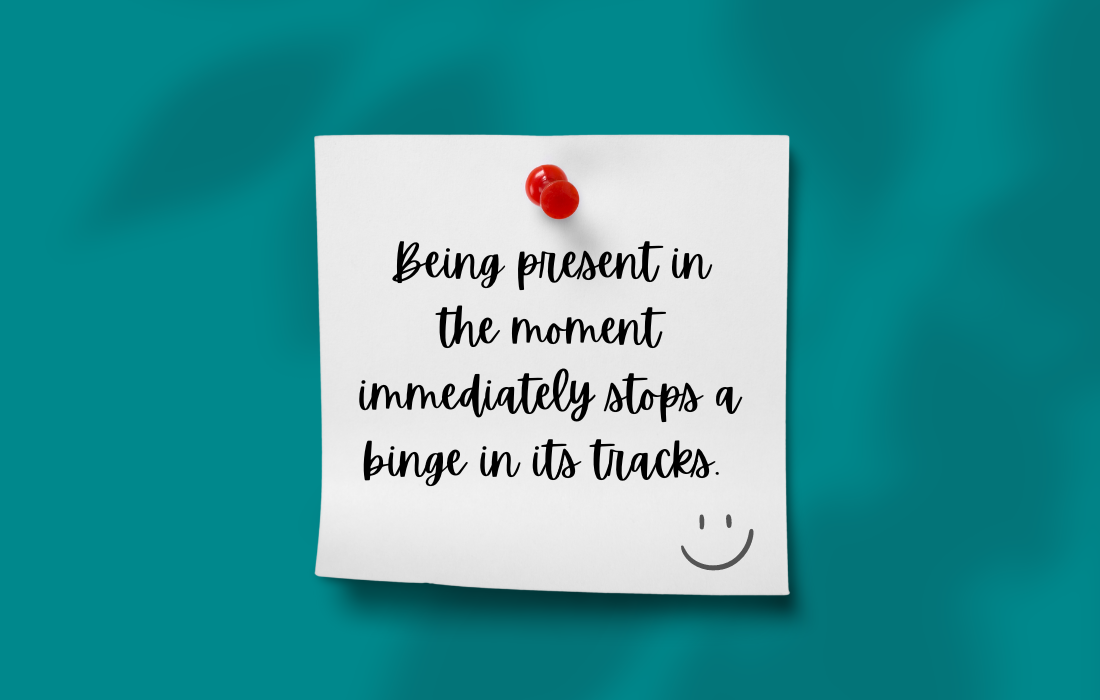
4. Decode Your Heart’s Appetite
If your brain is telling you to eat salads every meal, but your body wants a turkey and cheese sandwich, there may be a huge disconnect between the mind and the body. We want to work WITH them, not against them! Play around with what you really really really want to eat (and if that feels scary, I always recommend picking half and half–half what your mind says and half what your body says!).
5. Unravel Your Emotional Eating Patterns
Emotions play a big role in food. Journaling can be a great way to reflect on where your sticking points are during the day (or week). Writing can also help you pinpoint exactly who or what sends you to the food.

6. Journal about the Emotions that Drive Binge Eating
Taking this one step further, you can use your journal to assess when an emotion drives you to binge. When I first began, I would write down the time I ate, what I ate (not measuring or weighing, just “eggs and toast”), and how I felt. I could then look back and see what emotions really drove me to binge (my big ones were loneliness and uncertainty.)
7. Build Your Dream Team for Your Binge-Free Journey
What would it feel like to be supported in your healing? Who would you love to have help you on your path to food freedom? It could be a binge eating coach, nutritionist, therapist, group program, or any other person that would support you. (**Remember that it’s okay to admit not being able to do it on your own! I thought for many years that I could do it by myself, but realizing I needed support was a huge turning point for me.)
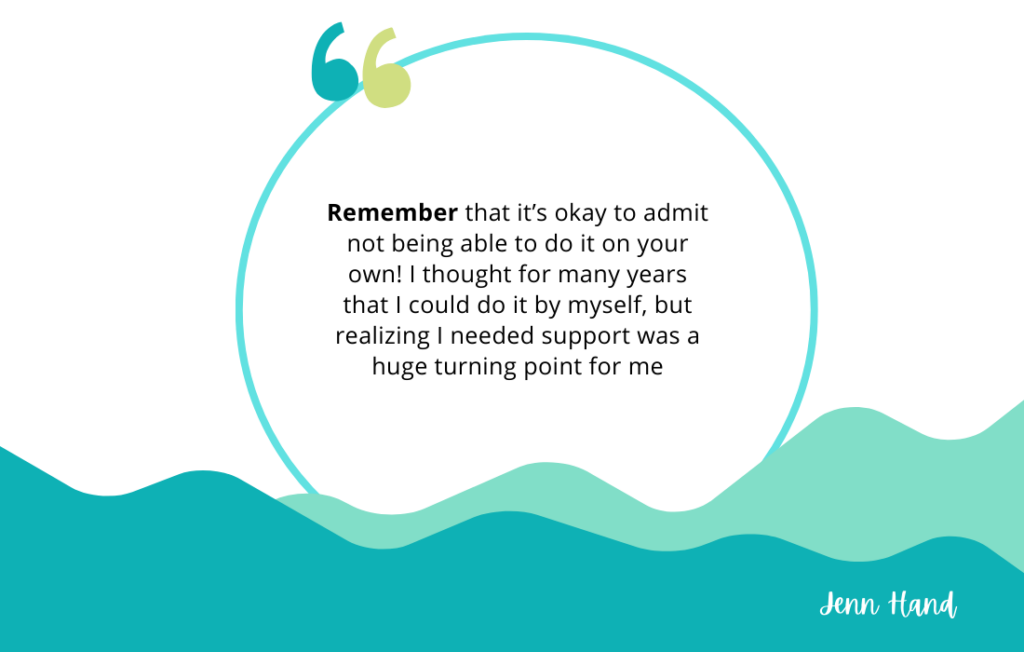
8. Create a Meal Plan That Nourishes You
For some people, meal plans can sound “diet-y”. I like to think of meal plans as taking time to create a gentle plan that helps set you up for “success”. If we get to the end of a long day and don’t have anything planned, we usually end up with the fastest easiest choice. But creating a gentle, nourishing outline of meals (and grocery shopping for them) is a wonderful way to take care of yourself.
9. Master the Art of Moderation: Decide How Much Food Is “Enough”
I take a more holistic approach to “portion control” and teach women how to find their own body’s signals of hunger and fullness. But if you need more structure, I recommend the plate method: fill half of your plate with whole grains, ¼ with veggies and ¼ with protein. Explore what feels right for you, depending on where you are in your journey!

10. Cultivate Body Love
One thing that sent me to a binge was swirling negative body criticism and thoughts. Working to cultivate a gentle softness with your body can work wonders in preventing a binge. Assess where you are and aim for one step forward. If you’re in a negative space, aim for neutral body thoughts. If you’re neutral, aim for gratitude. If you’re already grateful, aim for love.
11. Say Yes to Self-Acceptance
We’re usually our own worst critic. Working on a softer, more gentle approach to where we are in our journeys can be very healing. If “acceptance” sounds too far away, see if another word resonates: leaning in, softening, welcoming, embracing, meeting yourself where you are, or (insert your word/phrase here!)

12. Try Stress-Busting Tools to Gently Stop Binge Eating In Its Tracks
There are tons of tools out there to help, it’s a matter of experimenting to see what works for you. The tools that helped me the most were journaling, therapy, tapping (EFT), and meditating. When it was a “big” stresser causing a binge, distractions didn’t always help me (sometimes distraction can help, but for me, the bigger the feeling or stresser, the less a “distracting technique” worked). I typically needed to use one of the tools above to really “feel” and process the feeling so it didn’t lead to a binge.
13. Explore Non-Food Coping Tools
When we binge, we use food for a reason. Food becomes a way we deal with stress from a long day, a marriage we find stifling, a career that we don’t like, a child that drives us nuts, and the day to day hardships of being a human. So if we can find other ways to cope, it can help us let go of the need for food. What would help you deal with stress and the day to day life irritations? Experiment to see what non-food coping tools help you (ideas: writing, art journaling, breathwork, venting to a close friend, exercise, etc.)

14. Make a List of Fun Alternatives for Those Craving Moments
I used to have a list on my fridge of “5 things to do instead of eat”. This wasn’t necessarily when I wanted to binge, but more when I had a craving. On it, I listed out: declutter/clean (for some reason, this really helped me refocus my attention!), read a super compelling book, go out for a walk, journal, and call a family member. Experiment with things that feel fun as an alternatives for “what to do” when you have a craving (gardening, dancing, coloring, crafting, etc!)
15. Set a Rhythm for Your Eating Routine
Our bodies crave rhythm and routine; when we’re stuck in the diet/overeat cycle, our bodies often don’t know what’s coming. One of the aims to stop bingeing is to have a cadence of regular eating (I usually recommend eating every 3-4 hours as a starting point). This helps your blood sugar even out, your cravings to diminish, and lessons the need to have to rely on willpower.
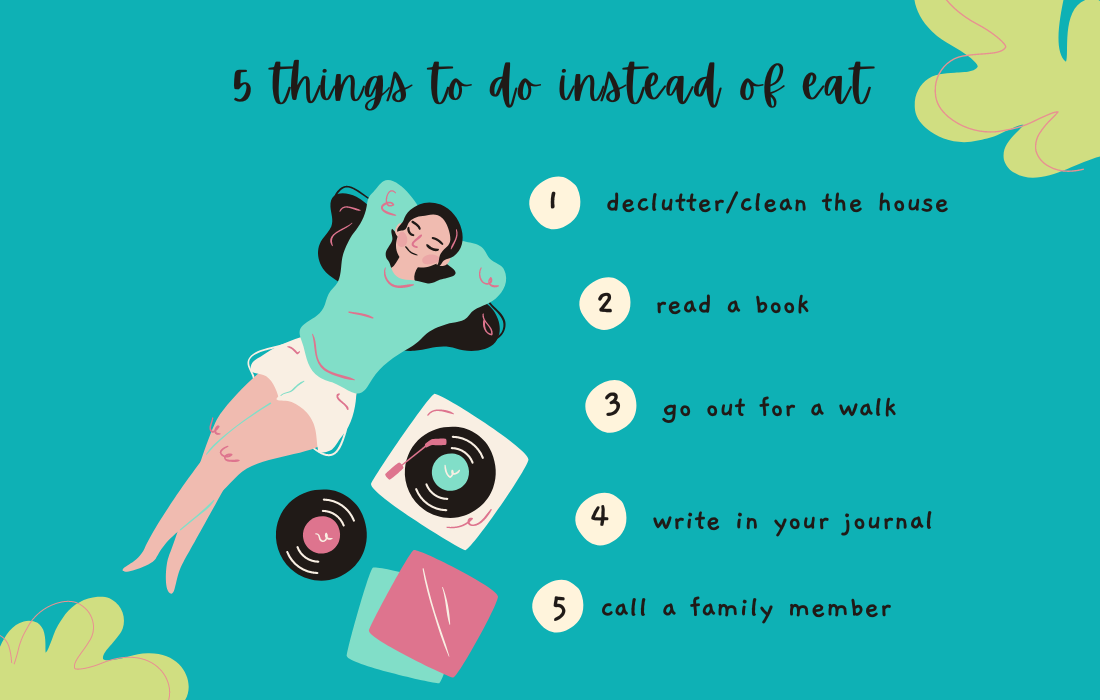
16. Discover the Power of Penning Down Your Food Journey
One of my favorite tools on this path to “normal eating” is journaling. I began a simple food journal and it ended up as a place where I could share my inner world of emotions, struggles, desires and disappointments, without judgment or criticism. Explore writing (or using voice notes) to process the ups and downs of your food journey. There’s something about transferring the jumbled mess of our thoughts onto paper (or audio) that brings clarity and healing!
17. Become a Hunger Detective: Separate Physical Hunger from Heart Hungers
When we’re eating and not physically hungry, it usually never satisfies what we deeply desire. There’s a big difference between physical hunger and emotional hunger. Physical hunger is a biological need that’s satisfied through eating. Emotional hunger is a longing from your heart: for connection, for love, for companionship, or for other deep heartfelt desires. Explore where your “heart hunger” is impacting your eating.

18. Snack Like a Pro
Going out to a restaurant or a gathering with food used to be huge triggers for me. I used to “save up” for these types of events and would always end up overeating. When I began focusing on not arriving famished by eating a snack beforehand, it helped me make saner food decisions. Having snacks (I usually pair a protein and a carb) instead of “saving up” for something can challenge our diet brain! But snacking can actually help keep overeating at bay since you arrive at meals or gatherings in a much more rational (non-hangry) state!
19. Make Protein A Part of Every meal
Protein can be a game changer when it comes to curbing binges. When you have protein every time you eat, it helps you digest your food more slowly, causes a less intense blood sugar spike and allows you to feel more satiated longer. Experiment with adding protein to your meals and see how it impacts your cravings!
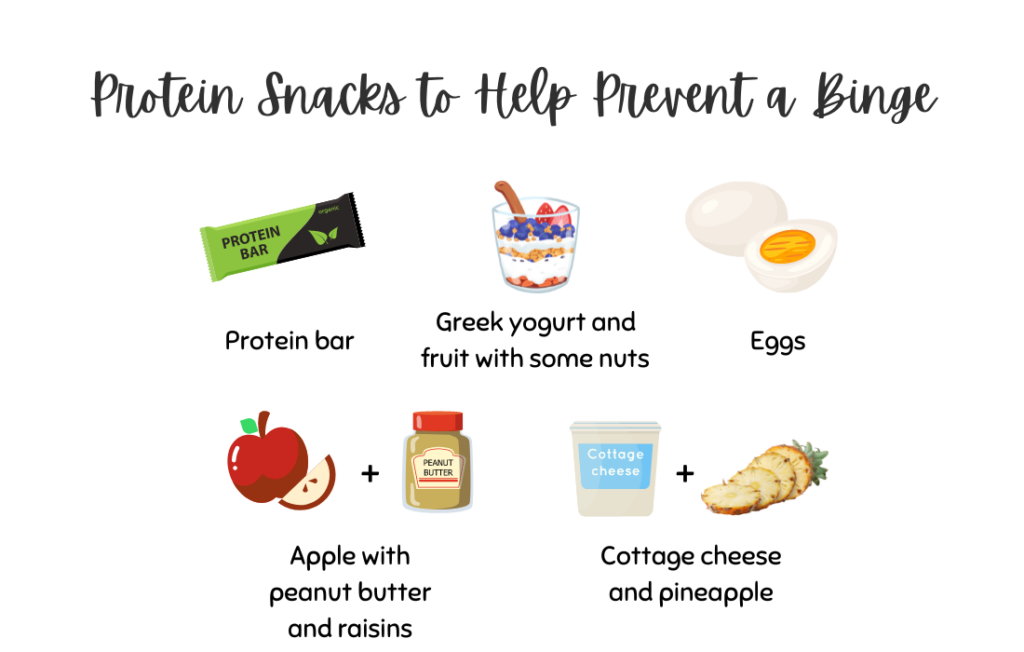
10 Protein Snacks to Help Prevent a Binge
- Turkey and cheese rollup (plain or on a wrap)
- Apple with peanut butter and raisins
- Greek yogurt and fruit with some nuts
- Cottage cheese and pineapple
- Hard boiled eggs
- Edamame
- Canned tuna (make a quick salad with mustard, a bit of mayo and celery)
- Jerky with some fruit or crackers (turkey, chicken or beef jerky)
- Rx Bars (or another protein bar made out of whole foods)
- Smoothie (chocolate protein powder + banana + peanut butter + milk of choice!)
20. Dance, Jog, Stretch, Move!
For many people, getting regular movement can be a challenge. If we think of exercise as “movement”, it can be a softer way to approach regular activity. Is there any activity you enjoy? A walk in nature? A dance class on Youtube? A gentle yoga class? Moving your body releases endorphins, which are the feel-good chemicals in our brain that lift our mood.

21. Cultivate Self-Compassion After a Slip-Up
Usually after a binge, we go down the rabbit hole of self-criticism. See if you can cultivate compassion and curiosity to help move you through the feelings of disappointment and frustration. Exploring what sent you to the binge and working to nourish and take care of yourself goes a long way in healing. It’s always kindness, not criticism that leads us to lasting change.
22. Dream Big, Start Small: Set Intentions That Make Sense
Instead of thinking you need to solve ALL of your “food struggles” today, are there 1-2 things you can focus on? We can have a long term intention, but looking at the day to day steps we can take makes this journey much more doable when it’s 1-2 small things to focus on!
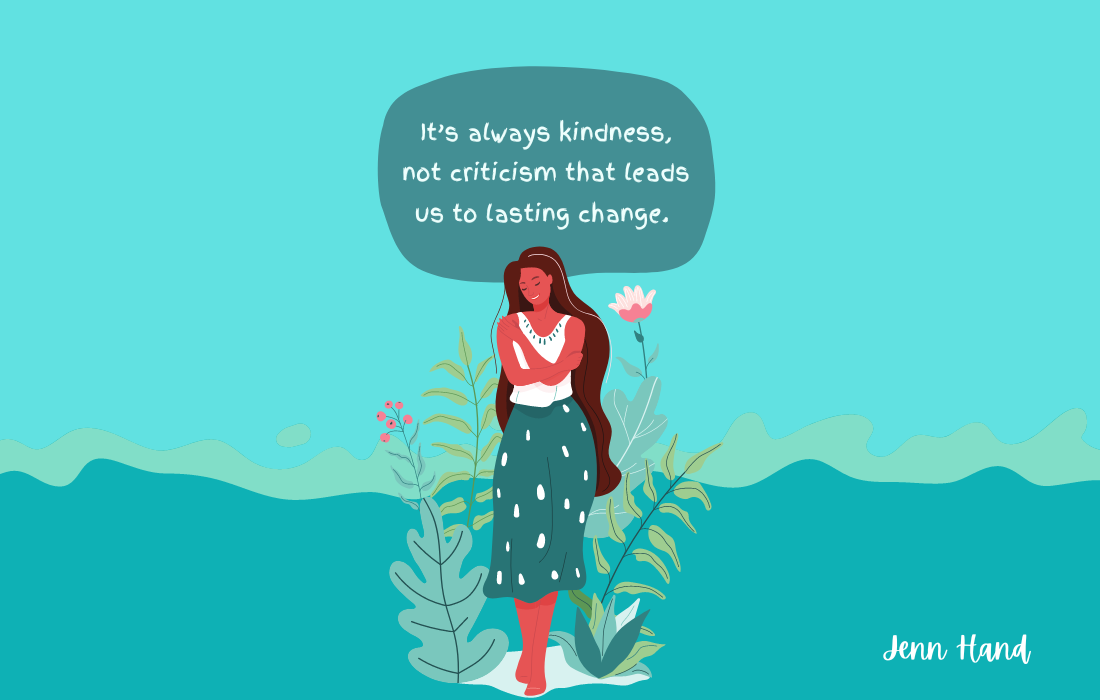
23. Tackle the Food Gremlins and Rewrite Your Food Tapes
Sometimes our old “diet tapes” (those negative spirals of rules and criticisms we learn in the diet world) can send us into a binge. Pay attention to what your rules are and what your mind is looping on repeat. (Some common ones: “I blew it, I may as well finish it”, “I can’t have carbs/bread/pizza for lunch/etc” and “I’ll just start over tomorrow”). When you can learn to catch yourself, challenge the rule and rewrite the script, it can be key in stopping binges.
24. Say Goodbye To a House Filled with Trigger Foods
I’m a big advocate of not keeping trigger foods in the house. There are enough temptations in the world, so why not keep your home trigger food free, if possible? If ice cream is your weakness, skip buying it the store. If you can’t keep leftover cake on the counter, give it to a neighbor. I can’t buy Wheat Thins, because I could eat the whole box. What are your foods that you know you can’t have just one of? Hint: don’t buy them, toss the rest or give it away. 🙂

25. Use Visualization to Paint a Binge-Free Future
When I was deeply struggling, I would spend a few minutes in my meditation practice visualizing what food freedom would feel like for me. It’s the same idea when athletes envision what it feels like to win the championship or take home the gold medal. I wanted to anchor the feeling of “freedom” in my body so it would become more and more familiar in my daily life.
26. Try Breathing and Relaxation Techniques for Anxiety-Free Eating
Going out to eat used to be a big binge trigger for me. I began employing “box breathing” when I would go out with friends to help calm my anxiety and relax my body. (You breathe in for 4, hold for 4, exhale for 4, and pause for 4). Experiment with deep breathing to help calm your mind and body before or during a meal.
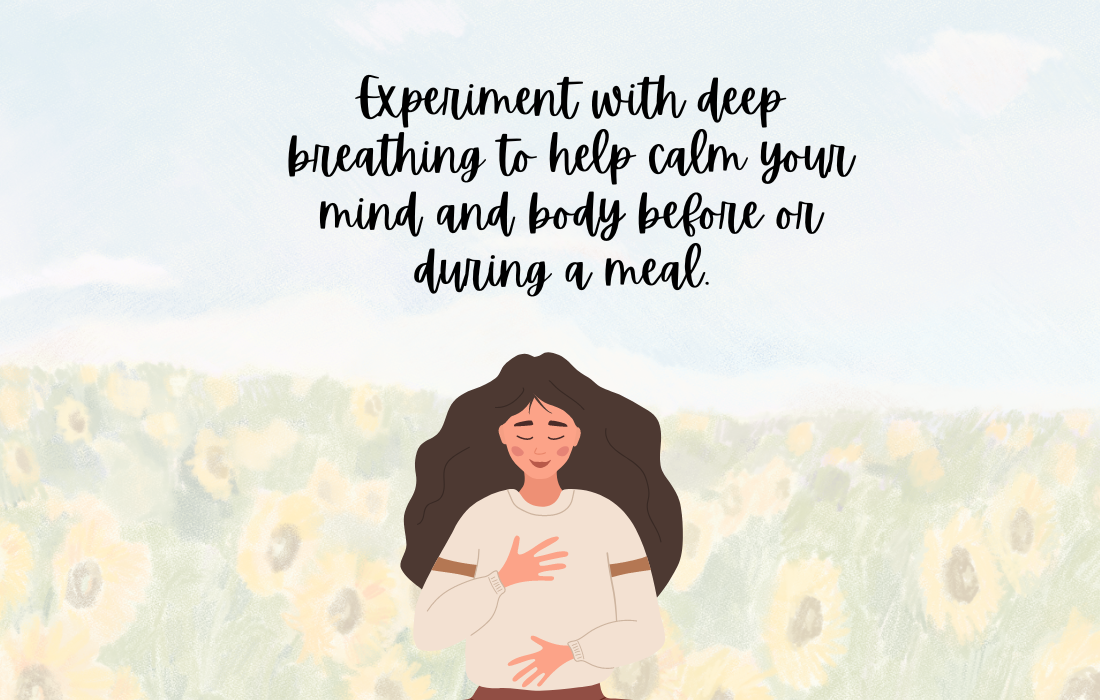
27. Ditch the Diet and Aim for Balance
Oftentimes, our default reaction to a binge is to go back on a diet so we feel in “control”. But going “on” something means we inevitably go “off” something, and keeps us stuck in the vicious cycle. See if you can aim for nourishment and balance instead of rigid rules of control.
28. Savor Home Cooked Nourishing Meals
One of the things I work with clients on is this idea of taking care of themselves with food rather than eating in a way that doesn’t serve them. Experimenting with cooking at home can be a wonderful way to take care of yourself, eat nutritious food, and nourish your body in a very tangible way.

29. Question Society’s Eating Norms
Societal norms have 1001 rules around food (like that dieting is the only way to lose weight and you can’t trust yourself around food, so have to follow this program.) A part of finding your normal around food is to let go of what society tells you is the “right” way to eat and find out what works for you and YOUR body. We are all different: some people do better with more vs less animal protein. Some digest starchy carbs easier than others. Some find sugar impacts them more than others. It’s your body and you get to decide what way of eating works for you (without all the rules!)
30. Feel More Satisfied after Eating with the Power of Fiber
One often overlooked nutrient is fiber. Adding beans, lentils, leafy greens, oats, chia seeds, and vegetables to your day is a great way to feel full and satisfied long after your meal is over.
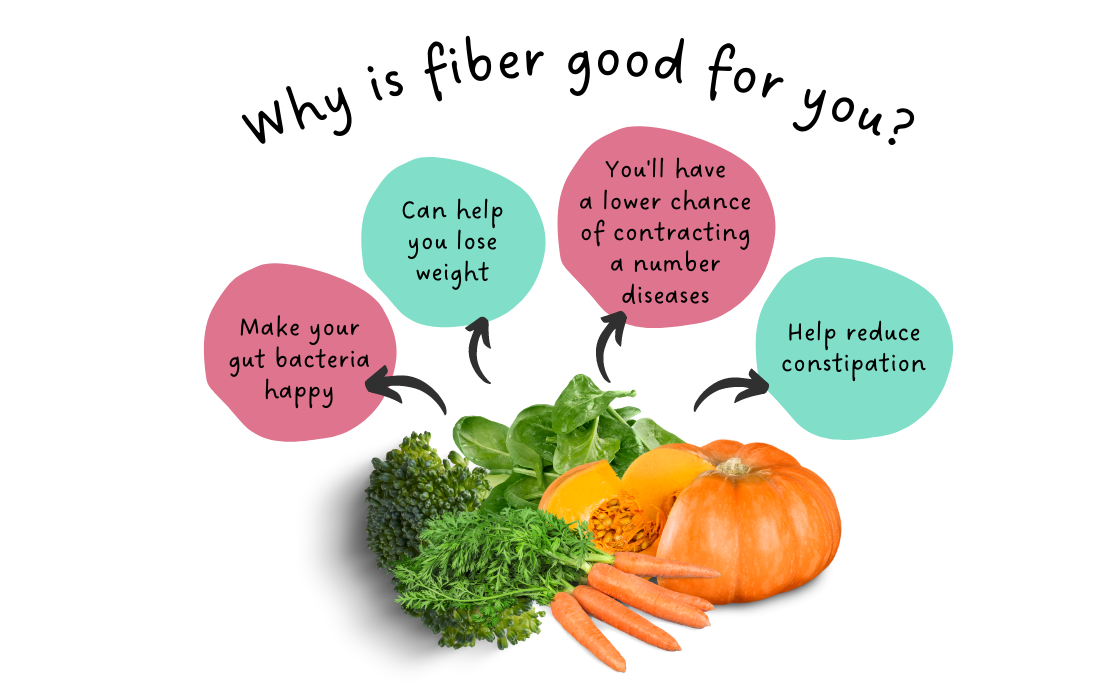
31. Understand the Benefits of Breakfast
The old cliché says it’s the most important meal of the day and it’s very true! Eating breakfast kick starts your metabolism to start burning calories and also helps keep your blood sugar more even throughout the day (which cuts down on cravings).
32. Embrace the Restorative Power of Sleep
Sometimes when we binge at night, we’re really just exhausted and need sleep! Check in to see how many hours you’re sleeping every night. Aim for 7 or more hours a night. A fun experiment is to see if you can find a good self-care wind down routine before bed (reading, soothing music, essential oil temple massage, a few yoga stretches, etc). That can help you disconnect and wind down to transition into a relaxed state for a restful sleep.

33. Try Small and Satisfying Meals
I’ve found great balance with smaller meals throughout the day (some of the women I’ve worked with prefer to aim for 3 meals a day, so skip this one if that’s your preference!). If it resonates with you, play around with eating smaller meals every 3-4 hours with foods that you find delicious and nourishing. It can help you feel more “even” throughout the day and being more even cuts down on binges!
34. Celebrate the Wins on Your Binge-Free Adventure
This is one I struggled the most with; I couldn’t see my progress because it wasn’t “big enough”. But letting go of bingeing happens slowly over time, so it can help to look at small wins to remind you that you ARE making progress. Things like going for a walk when you’re stressed, cooking at home instead of eating out, saying no when you would have said yes, and taking time for yourself during the day are all small wins to celebrate!

How I Stopped Binge Eating and Lost Weight Naturally and Holistically
I was stuck in the diet/binge cycle for 13 years.
When I began to get help, my binges didn’t cease immediately (as much as we want them to just stop, it’s a process of letting go of bingeing over time). One of my main focuses was resisting the temptation to start a diet any time I felt like I wanted to lose weight faster, I had binged, or I wanted to be back in “control”. Letting go of dieting allows you to stop bingeing, since you don’t go “on” something, there is no need to go “off”.
This was a huge mindset shift for me that changed slowly over time.
There can be a period when you’re normalizing your eating and working to get out of the cycle, that you may gain weight (this doesn’t happen to everyone). If you’ve spent years dieting and and trying to find your balanced, sustainable way to eating, there may be a period of your weight readjusting. But over time, as you find your own “normal”, you can then balance out to your body’s happy weight!
Work with an Emotional Eating Coach and Holistic Nutritionist
If you feel like you can use some extra support to make progress faster on this journey, 1:1 work can be transformational. On my own journey, I was very reluctant to admit I needed more help. I thought I could do it all on my own. But finally realizing (and admitting!) I needed support helped me in ways I hadn’t imagined. 1:1 work helps you dive deep into where you’re stuck, what issues you can’t seem to work through and heal from any patterns you want to break. Since 2014, I’ve worked with hundreds of women to learn how to deal with life rather than turn to food, stop bingeing and break free from the frustrating diet cycle. If you feel drawn to explore coaching, schedule a 20 minute call with me here!
Schedule a 20-min CallCommon Questions about How to Stop Binge Eating
How do I stop the urge to binge eat?
One helpful way to stop the urge to binge eat is to take 5 deep, slow, conscious breaths, as awareness and compulsion can’t coexist at the same time!
Is bingeing a coping mechanism?
Bingeing can be a coping mechanism to deal with overwhelm, stress, hard emotions and other challenging situations life throws our way.
Can you reverse binge eating?
There is hope; you can “reverse” binge eating and are not doomed to a life of being stuck in the diet/binge cycle.
How can I stop binge eating at night?
You stop binge eating at night by working on the underlying emotional causes of what drives you to use food.
How can I stop binge eating when stressed?
To stop binge eating when you’re stressed, it’s helpful to create a toolkit of non-food ways to deal with overwhelm and anxiety so you have other coping mechanisms other than eating.
How can I stop binge eating when bored?
To stop binge eating when you’re bored, you can approach it in a dual manner: work to sit with the discomfort of feeling what boredom feels like and explore ways to spend time that fill your soul.
More Articles About Holistic Weight Loss and Intuitive Eating
⚪ How to Get Off the Diet Roller Coaster
⚪ Why You’re Binge Eating Sugar
⚪ If You’re Not Dieting, How Will You Lose Weight?
Work with an Emotional Eating & Holistic Nutrition Coach
Overcome Bingeing and Emotional Eating, and Break Up with Yo-yo Dieting
Working with an emotional eating coach and holistic nutritionist can help you get free from the frustrating binge and restrict cycle and stop yo-yo dieting.
You don’t have to be obsessed with food or have a million rules around eating to find your natural weight and learn to love your body. Ready to actually see a lasting change and experience true freedom?
Schedule a 20-min CallAbout the Author:
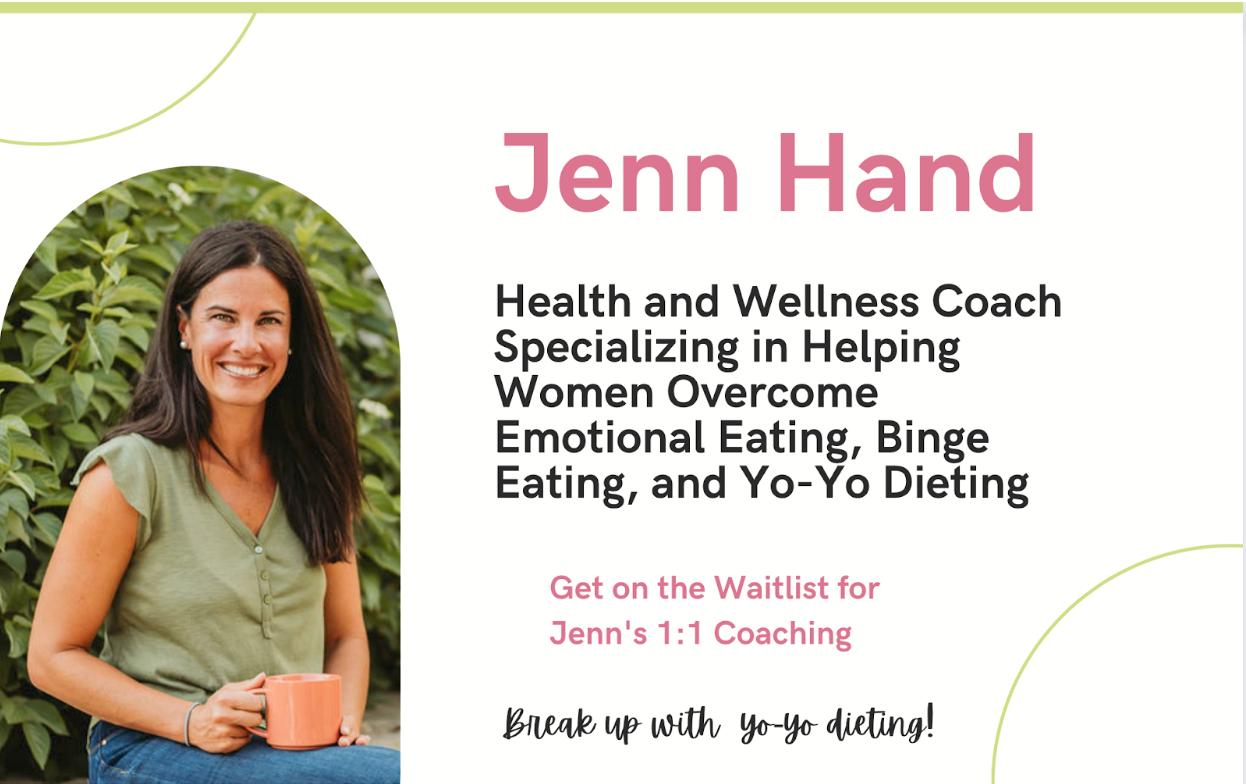
Jenn Hand has been helping women like you become normal eaters since 2015.
She’s worked with thousands of women, helping them to balance their bodies, end bingeing, stop obsessing over food, and start feeling amazing again. As a board-certified health coach and holistic nutritionist, Jenn knows how to support you in making real positive changes that last.
Her articles have been published on Mind Body Green, Tiny Buddha, Thrive Global and other local and global media platforms. She’s the author of How to Be a Normal Eater and the creator of The Normal Eater’s Club program. Listen to Jenn’s advice and tips on the Cake Doesn’t Count Podcast, or read more of her articles for free on the Food Freedom Blog.
Learn About Coaching!
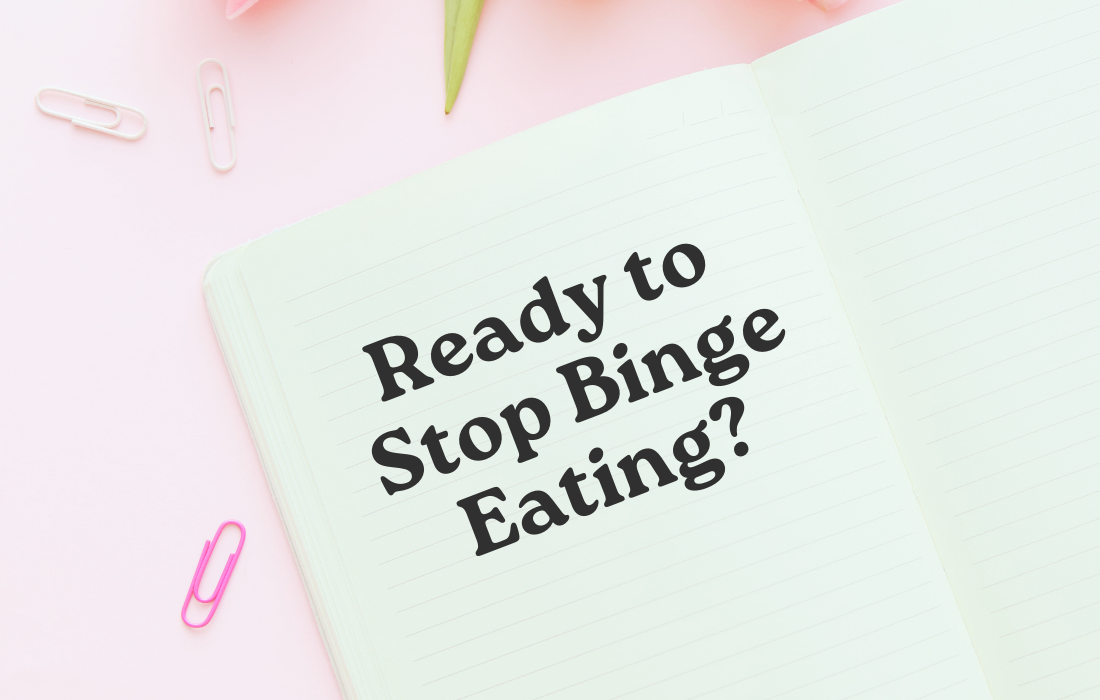




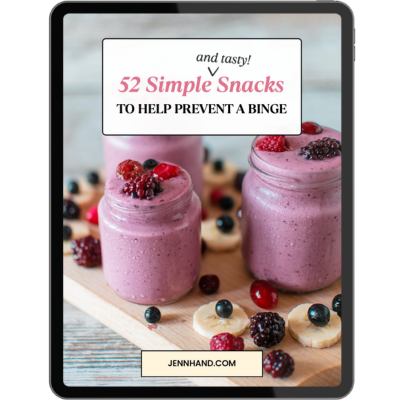
All fantastic tips!
My bingeing has almost disappeared since following your advice, Jen!
Much gratitude for the content you share 😊
How amazing Jody! I’m so glad the content has helped 🙂 xo